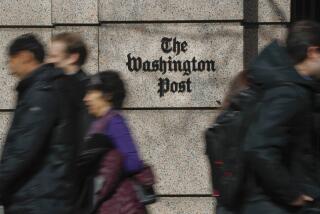Canceled Book Adds Fuel to Jerusalem Post Tiff
- Share via
JERUSALEM — The Jerusalem Post on Thursday canceled publication of a book about human rights in the Israeli-occupied West Bank and Gaza Strip, making a move that is sure to fuel conjecture that the influential and traditionally liberal paper is taking on a marked conservative slant.
The book, entitled “Essays on Human Rights,” was edited by Meron Benvenisti, the leading Israeli authority on the occupied lands. It was one of a series on the occupied region that the Post’s book-publishing department was putting out.
Benvenisti is suing to have the book published as planned. “This is clearly an attempt to suppress the book. The act reflects the publishers’ real political views,” he stated.
There have been months of tumult at the Jerusalem Post after its purchase last year by Hollinger Inc., a Canadian company. Post editor Erwin Frenkel and about 30 editors and reporters have resigned to protest what they called editorial interference by the new publishers, who are represented by a retired army colonel, Yehuda Levy.
Publisher Levy maintains that cancellation of Benvenisti’s book is part of a streamlining operation to make the Post profitable.
“Our move has nothing to do with human rights,” he said. “We have simply decided to break away from activities that have nothing to do with the newspaper.”
Levy has been in control of the manuscript since early December but said he had not read it.
The Post has been advertising the seven-volume “West Bank and Gaza” series for several months; five books have been already published. The planned sixth volume, “Essays on Human Rights,” covers topics such as confiscation of Palestinian land, labor conditions for Palestinians, the legal system in force during the Arab uprising and censorship of Arab publications.
The Post, which is published in English, came under attack by Prime Minister Yitzhak Shamir last year for its hard-hitting reporting on the intifada, or Arab uprising. Shamir is said to have especially resented the Post’s reach to foreign audiences through its weekly international edition.
The drama at the paper is part of a larger debate in Israel over the role of the press, both domestic and foreign, in covering the Israeli-Palestinian conflict. Government officials say reporters skew coverage to favor the Palestinians. Journalists are chafing under steady attempts to limit coverage of the conflict through censorship and military prohibitions on traveling to the West Bank and Gaza Strip.
In a column published Jan. 21, Yosef Goell, a member of the Post’s editorial board, sharply criticized the newspaper’s past coverage of Israel, which he characterized as “scorched-earth” journalism.
“A definite pro-Palestinian and anti-Israeli bias had begun to creep into the newspaper in its treatment of news linked to the Palestinian, territorial and intifada issues,” Goell wrote. Several other staff members attacked Goell’s remarks.
More to Read
Sign up for our Book Club newsletter
Get the latest news, events and more from the Los Angeles Times Book Club, and help us get L.A. reading and talking.
You may occasionally receive promotional content from the Los Angeles Times.









